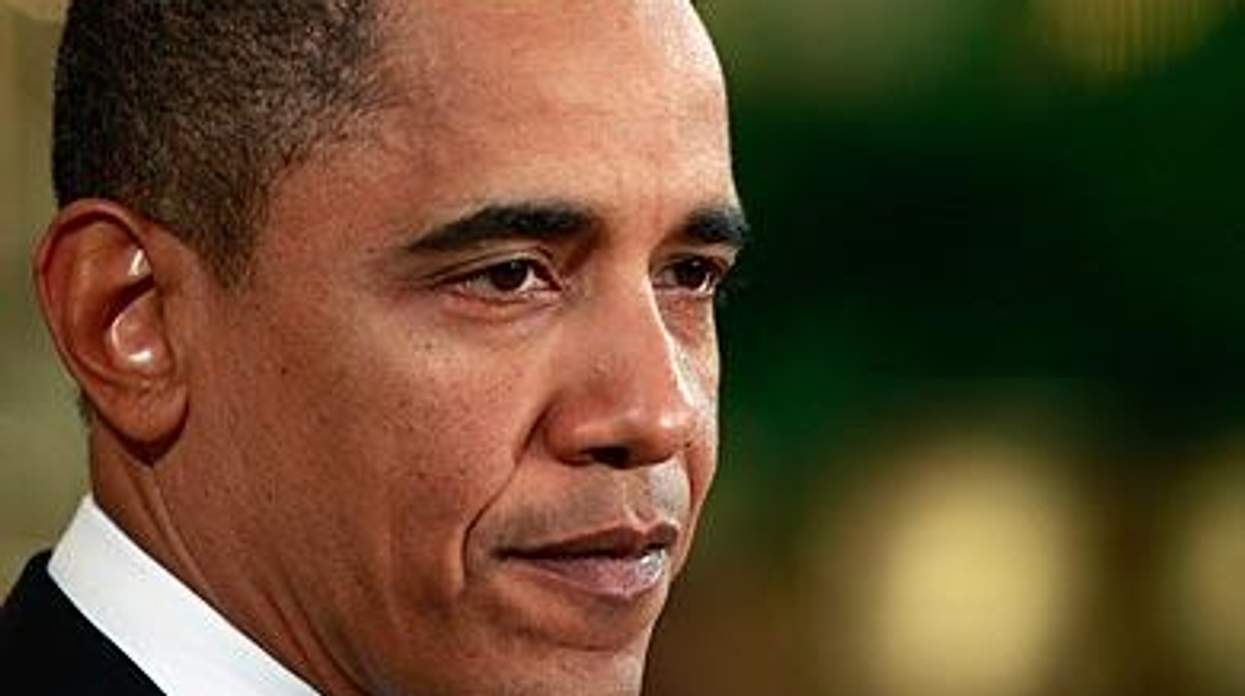A flash of anger crossed President Barack Obama's eyes Monday night as a group of LGBT protesters heckled him into silence during a speech he was delivering at a Los Angeles fund-raiser for Sen. Barbara Boxer.
As someone who has studied Obama's many speeches over the last three-plus years, I will tell you that it was a rare and potentially even remarkable moment. If you have not seen the video, take a look. It's a longish clip (the real action comes at about 1:05, 2:10, and 5:00), partly because the activists slowly and persistently ramped up their protests over the course of nearly 10 minutes.
Not to gloat at the president's frustration, but this was the classic case of a successful act of civil disobedience in more ways than one. First, the president personally heard and felt the burgeoning rumble of discontent among LGBT Americans in a way that has not touched him since he entered the insular walls of the White House over a year ago.
And equally important, so did many, many others. That night, the subject line of the dispatch issued by the pool reporter covering Obama's speech read, "Pool report 5 -- NEWS gays rights protesters interrupt." The "pooler," by the way, is the reporter assigned to take notes and record the developments at an event that is then distributed to all the other reporters who were unable to cover it.
Those dispatches, which flood the in boxes of a couple thousand mainly mainstream reporters, usually carry a subject line that simply reads "Pool report." But that night, reporters received an e-mail that immediately clued them in to the fact that something had gone awry during Obama's address. The effects were immediate and sweeping, with the video making its way straight to the top of a visibility jackpot, the Drudge Report, and getting played repeatedly during a panoply of political shows the next day.
The potential effects of an action as penetrating and visible as this were summed up best by Richard Socarides, who as the former LGBT adviser to President Bill Clinton knows what it's like to be inside the White House walls looking out.
"That next morning, I bet they were a lot more focused on 'don't ask, don't tell' than they were the night before, because when he got off that stage, people knew he was not a happy president," Socarides said at an LGBT Town Hall broadcast Thursday on The Michelangelo Signorile Show.
As Obama tried to quiet the protesters at one point during the speech, he noted that both he and Senator Boxer support repeal of DADT and added, "It would make more sense to holler that at the people who oppose it."
But the president employs some specious logic here. Achieving repeal is so close now that it's not about the opposition anymore, it's about the people in power.
All the lobbyists working on this issue agree that the Senate Armed Services Committee is within 2-3 votes of attaching a repeal measure to the defense authorization bill. And the ability to sway those last few senators comes down to a question of the resolve of our president and the Democratic lawmakers who control Congress.
Let me be clear, this president and this Congress are within two or three votes of making the greatest civil rights advancement on behalf of LGBT Americans in the history of this country. That's the good news.
The bad news is, White House press secretary Robert Gibbs signaled this week that the resolve doesn't actually exist to capitalize on that extraordinary opportunity.
Later that day, the Human Rights Campaign's David Smith told me, "Those comments were not helpful, and the White House needs to clarify that." But that clarification has yet to come, which leads any logical person to believe the White House is willing to take its chances on repeal in 2011 rather than focusing its efforts on what's possible now.
During an interview with The Advocate in April of 2008, Obama said, "I don't think that the gay and lesbian community, the LGBT community, should take its cues from me or some political leader in terms of what they think is right for them. It's not my place to tell the LGBT community, 'Wait your turn.' I'm very mindful of Dr. King's 'Letter From Birmingham Jail,' where he says to the white clergy, 'Don't tell me to wait for my freedom.'"
It seems safe to surmise that Monday night's protesters don't want to wait until 2011 to begin anew on finding the votes to pass repeal legislation. It also seems likely that the six LGBT veterans who handcuffed themselves to the White House gates Tuesday want their freedom now, not later.
But it appears that President Obama and his political team have yet to get the message that LGBT Americans don't want to watch in silence while Washington squanders the best opportunity in 17 years to right an unjust law.















